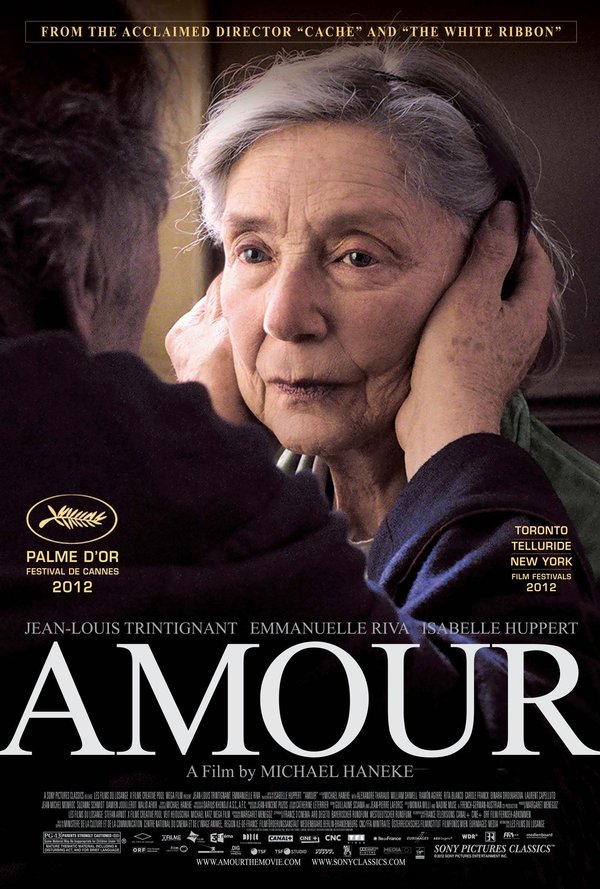 Amour
Directed by: Michael Haneke
Cast: Emmanuelle Riva, Jean-Louis Trintignant
Running Time: 2 hrs 7 mins
Rating: PG-13
Release Date: January 11, 2013 (Chicago)
Amour
Directed by: Michael Haneke
Cast: Emmanuelle Riva, Jean-Louis Trintignant
Running Time: 2 hrs 7 mins
Rating: PG-13
Release Date: January 11, 2013 (Chicago)
PLOT: An elderly couple's love is tested when the wife (Riva) suffers a stroke and requires the constant care of her husband (Trintignant).
WHO'S IT FOR? Amour isn't brooding, but it is slow. Most of all, it can best be appreciated by those who have a mature understanding of the most important bonds within a relationship.
OVERALL
In her now Oscar-nominated performance, Riva (who once starred in lauded foreign classic Hiroshima, Mon Amour) provides a turn that is equally as physical as Naomi Watts' also nominated portrayal in The Impossible. Throughout this performance, we watch Riva physically fade away. Riva spends much of the time stationary, her physical requirements constantly reduced, not to mention her waning ability to interact through dialogue with her husband. And yet, she maintains such honest charisma as Anne, a woman who is too proud to amuse pity. Riva provides this involved portrayal as if, in some very bizarre but effective way, she as an actress is prepared with the adequate knowledge to face the end of her days herself.
Trintignant provides a sweeter part of the story, as the support system necessary to keep Anne alive. He shows the other side of persevering through the sadness of seeing the ones we love change for the worst, offering a calm portrait of a man trying to maintain patience and composure through unusual circumstances. A fine example of his tenderness is on display in a scene in which he interacts with a pigeon who has flown into their apartment through an open window, during what we can imagine is one of the loneliest parts of his life.
While Amour might sound like a large serving of emotional oatmeal mush, or a two-story-tall pile of sadness, it isn't. Amour has loveliness as a valentine to the feelings of real love, as it shows the difficult passages of a relationship, especially when one person starts demanding the physical care of the other to survive. While we may be used to seeing younger couples as examples of love, Amour is striking as a type of movie that doesn't allow us to forget that even our favorite movie couples, never mind our own, will be going through this experience. Haneke presents such a crucial yet overlooked area of human life with a touch that avoids maudlin or safety. Even when Haneke daringly toys with poetry, both in its resolution and a dream sequence, Amour does not have a false aching bone in its body.
Michael Haneke is a filmmaker who sees suffering as a very element of the human experience, and he is active to change the impression that it can be corruptible within the world of film. This can certainly be sensed in his brilliant, angry treatise against torture film culture Funny Games, an audience-challenger he made a second time with obsessive desire of having it play for the right viewers (those who will sit through it). This mindset is nonetheless the foundation of Amour, where starkness is considered to be the only true language of human communication.
With static cinematography ingrained in the silent atmosphere of the house, faded coloring, and the aforementioned lack of music, Haneke's most aggressive aesthetic tool to the gentle construction of Amour is his editing, which shakes the viewer with unexpected hard cuts from scene to scene. It makes the film's concept of the true passage of time all the more evident, jolting viewers with the experience of cuts to loud sounds, like the whirring of vacuums, or as in with the beginning of the film, the sound of a door being burst open by police.
With these explosions providing the only interruption of this film's quietness, Amour is a film that so brilliantly captures the stillness of an empty house, a heavy honesty to old age, and the film's largest element of horror. In this manner, Amour is certainly one of the most triumphant films to capture a tough human detail, while observing both the responsibilities of love and the fleeting of mortality. Many films, from Leo McCarey’s Make Way For Tomorrow to Up, have presented such, but they often rely on reaching audiences with a lighter touch. That being said, Haneke isn't so much a cynic, so much as he does not want to be a liar.
Many films, as inspired by non-fictional emotions and or events, aim to find escapism in their truths. This is certainly the case with the films recently celebrated as possible candidates for “Best Picture,” including Argo, Beasts of the Southern Wild, Django Unchained, and Zero Dark Thirty. With these films, true events are turned into entertainment, the spirit of such captured in however a filmmaker wants to manipulate it to provide audiences an engrossing experience; the actuality behind such events is an afterthought. (Haneke addresses this through a piece of dialogue spoken by Anne as she asks Georges to let her die: “Imagination and reality have little in common.”)
Amour, the most difficult of all films to be nominated this year, is the passionate product of a writer/director thoroughly uninterested in providing his audience the lull of entertainment. Based on an original screenplay by Haneke, this is a film in which while its inspiring emotion may be its only non-fictional element, this stunning story of love and death has no sense of escapism; Amour can not be mistaken for fiction.
FINAL SCORE: 9/10
